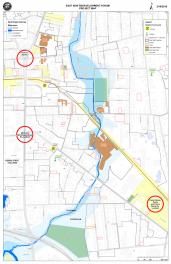Keene resident Andrew Graham went to a recent public hearing about what to do with several large vacant buildings in the city of 23,000 people. “The former middle school should be converted to apartments,” he told the Valley Post. The middle school has been vacant since 2012, Keene planning director Rhett Lamb told the Valley Post.
Building more apartments should result in lower rents in the city. At least one life might have been saved had more affordable apartments been available this winter. Russell Holden, age 46, died in Keene on January 14 when his illegal shelter caught fire. He had been homeless.
The Keene mayor and city council, and the state and federal governments could pay to convert some or all of Keene's vacant buildings to apartments by raising taxes on rich people. Rick Cohen lives in Keene and is one of the richest people in the world. In 2013, he had a “net worth” of more than $11 billion, according to an article published that year in Bloomberg News.
In Vermont, women are twice as likely to live in poverty as men, according to a Vermont Public Radio report that is scheduled to air on March 9. Also in Vermont, “there were 422 income tax filers with adjusted gross income of $1 million or more in 2013,” the most recent year for which data is available, Paul Cillo told the Valley Post. He works for www.PublicAssets.org. Vermont's population is about 600,000; New Hampshire's is about 1.3 million; Massachusetts is home to about 6.7 million people.
There are six states that tax rich people more heavily than Vermont does, Cillo said. Vermont Governor Peter Shumlon frequently says rich people will leave the state if their taxes go up. But Cillo said, “There have been many studies about the question of whether high income people leave the state when income tax rates go up. The evidence from around the country is that they don't.”
If rich people wanted to live where taxes are lowest, they would all live in states like Texas and North Dakota, and in nations like Somalia, which had “no effective government” from 1991 until 2012, according to the BBC.
Brattleboro resident Robin Rieske, in a letter-to-the-editor published in a local newspaper on March 7, said, “I believe that the legislature should look to the wealthier Vermonters to finally pay their share and to stop putting the tax burden on the lower and middle class.” She said Vermont should follow the lead of Minnesota, which has had success raising taxes on the rich.
In Massachusetts, due to tax cuts for the rich, between 2001 and 2015, "funding for higher education has been cut 24 percent, environmental protection and recreation (parks, swimming pools, rinks) has been cut 33 percent... early education and care has been cut 23 percent and funding for public health has been cut 25 percent." That's according to a report released on March 6 by www.MassBudget.org.
Keene resident John Bolster went to the same Keene public hearing that Graham attended. Bolster praised Keene's Robin Hood Forest and Horatio Colony Nature Preserve. “Those parks are precious,” Bolster told the Valley Post. “We should add more green space to the city.” Some of the more decrepit vacant buildings could be converted to open space, he said. Bolster said people who want to join in the effort can contact him; his phone number and e-mail address are at his web site:
Robin Hood and his fellow activists took from the rich and gave to the poor. “The city council will only bend under popular demand,” Bolster said.
---------
The below map shows vacant buildings in Keene. To read it clearly, click on it, scroll down and click "see full size image," then click on it again.
This map is by the City of Keene and is used with permission.

Post new comment